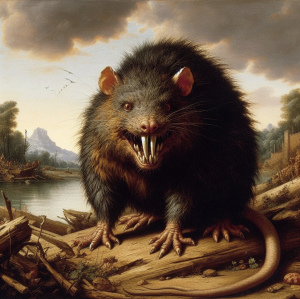Giant Rat
| Class | Vermin |
| Rarity | Rare |
| Size | Large |
| Stats |
8 HP 10 Strength 6 Defense 4 Agility 2 Intelligence |
Introduction
Deep within the humid swamps and barren fields, there are mutated creatures, vermin in nature, and a plague because of their large numbers and the diseases they bring. These feral beasts are large and only out for food. If you encounter one, you already know there will be many coming for you as they have smelled the scent of prey.
Description
The giant rat is a mutated version of a common rat, bearing many similarities with one big difference, their enormous size. Giant rats have a way larger head and their ears are also much bigger, the ears being round in shape. A giant rat has two pitch-black eyes and a long snout which grows large whiskers. The tip of the rat’s snout is the only part of its body that doesn’t grow fur. The rest of the rat's body is covered with thick and repellent fur. The color of the skin varies from shades of brown to gray and black, sometimes with spots. Further down, a giant rat always has a large belly, which is barely supported by the tiny legs and feet it uses to walk. A giant rat reeks like sewers and rotten food, and the fur is sticky and a little humid.
Behavior
Giant rats are hostile to anything they see that is not one of them, although they can also get in conflict with one another over just about everything, ranging from females to food to territory. They do not hibernate. Giant rats reproduce year-round, as long as there is plenty of food available and temperatures are not extreme. A female can birth up to five younglings, truly spreading like a disease. Females can re-fertilize every four to six months. In general, they eat just about anything they can find but are mainly attracted to dirt. There is a chance that the giant rat can sometimes come quite close to towns or villages. They stay in caves during the day and go out hunting at night. From just after the sun sets until just before the sun rises again. The rat generally adapts easily to other living environments. For example, rats are very good swimmers and can also climb and jump well.
Habitat
The giant rats like to live in cooler, humid places, such as dark caves, swamps, or large plains. Since the giant rats are so large, they often create their place to live by digging burrows close to river banks and trees or just anywhere in the ground. Their nests are then built in these burrows in which the little ones are raised until they can live independently. Giant rats mostly live in the swamps of Magna Attia, the Hinterlands, Heartlands, Norlands, and the Delorwaki Savanna.
Abilities
A giant rat will first off try to quickly end anyone it engages, biting them asity the hope of quickly eating its prey. This site is extremely strong (D4), but they only use it when engaging their targets. If the prey survives the bite, the rat will make a melee attack with its claws, which are not as strong as the bite (D2), but the claws are long and sharp, and they can carry disease. The vermin can also use its tail to hit multiple targets (D2). A giant rat is not immune or resistant to any form of damage.
Drops
Rat teeth
The teeth of the rat can be harvested as soon as the beast dies. They are large, dull, and creamy white. Cutting yourself on it might carry a disease over to you.
Rat fur
When the fur of a rat is harvested, it can serve as clothing because of the thick layer the fur consists of. The color of the fur depends on the color the giant rat has.
